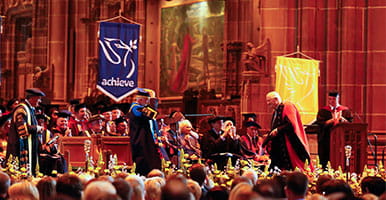Lord Ernest Oxburgh
Presented by Professor Frank Sanderson
Honorable Pro-Chancellor, I have pleasure in presenting Lord Oxburgh of Liverpool for the award of an Honorary Fellowship of Liverpool John Moores University.
Lord Oxburgh of Liverpool, internationally-renowned geologist and geophysicist, has made a telling impact not only in the academic world but also in industry and government, particularly in fields related to energy and the environment. His pre-eminence has been recognised with numerous prestigious appointments and high honours throughout his career. We are pleased to celebrate the achievements of this outstanding Liverpudlian.
Ernest Ronald Oxburgh was born in Liverpool in 1934. Choosing not to be evacuated, the family stayed in Liverpool throughout the War, and young Ron witnessed the great devastation caused by the regular air raids - on one occasion, picking his way through the rubble of his grandfather's printing works.
Like many other notable Liverpudlians such as Paul MacCartney and Peter Sissons, he attended Liverpool Institute on Mount Street where he excelled academically. Despite always wanting to be a scientist, he was prevailed upon by an extremely persuasive headmaster to read Classics at Oxford. Two years of Greek and Latin did not change his scientific aspirations, and he made enquiries about science-based courses. After considering Mechanical and Civil Engineering, he eventually switched to Geology and graduated with honours two years later.
Next he went to Princeton University to do his PhD with one of the world's leading geologists which he describes as one of the best decisions he ever made. Whilst there, his fiancé Ursula came over from England and they were married in Princeton University Chapel. Ursula is here today. On completing the PhD, Ron took up a temporary appointment teaching Geology and Geophysics at Oxford and stayed for the next 18 years. During this time, he laid the foundations of a formidable academic career in which he has taught and researched at not only Oxford, but also Cambridge, Cornell, Stanford and California Institute of Technology.
During the 1980s he was Head of the Department of Earth Sciences and President of Queens' College Cambridge
From 1987 - 1993, he was Chief Scientific Adviser to the Ministry of Defence
From 1993 until his unretiring retirement in 2001, he was Rector of Imperial College.
His research and publications have largely focused on the thermal behaviour of the Earth's crust and his current interests are climate change, energy and water futures, and global development.
Climate change makes him ""very worried for the planet"", seeing little hope for the world unless carbon dioxide emissions are dealt with. These views, together with his commitment to corporate social responsibility made him an interesting appointment as chair of Shell in 2003. He strongly advocates tougher laws and taxes on using oil and gas so as to reduce CO² emissions into the atmosphere.
During his two years at Shell, he helped to formulate their strategy of gaining expertise in the various environmentally-friendly technologies, such as wave and tidal power, that may play a role in meeting future energy needs. He stresses the importance of government leadership and action, acknowledging that oil and gas will not be displaced if everything is left to market forces. And he has spoken about the rapidly increasing energy needs of emerging countries such as India, Brazil and China, and the responsibility resting with the developed nations to help them embrace clean non-polluting technologies.
In his busy career, he has also been involved in charity work, most notably when he chaired the Science, Engineering, Technology and Mathematics Network to promote the subjects among young people. For many years, he regularly visited schools, acting as a science and engineering ambassador.
His expertise and pre-eminence in his field has been recognised in many ways
He is a fellow of the Royal Society
He is a fellow of the Royal Academy of Engineering and the US Academy of Sciences
He is an honorary professor at the University of Cambridge
Chairman of the board of trustees for the Natural History Museum, London.
He has chaired various government committees including one on the safety of British nuclear weapons
He was knighted for his services to science in 1991
He was appointed to the House of Lords in 1999 where he serves as an independent member
Until recently he was Chairman of the House of Lords Science and Technology Select Committee and
Chairman of Shell Transport and Trading until last year
Still actively involved in public life and an energetic member of the House of Lords, Ron gave up orienteering and marathon running when his knees refused to take the strain. Now revitalised with bionic knees, his physical recreation consists of mountain walking with Ursula whenever he gets the chance.
Lord Oxburgh is a man of many talents who has applied himself to his chosen field with great distinction. A reluctant classicist who went on to become one of the leading geophysicists of his generation, and a man who has made a telling impact not only in the academic world but in government and in industry. A man whose views on climate change and energy policy we ignore at our peril. He is a true polymath and we are proud to honour him today.
Thus I have pleasure in presenting Lord Oxburgh of Liverpool in the County of Merseyside, this most distinguished son of our region, for admission to our highest honour of Fellow of Liverpool John Moores University.



